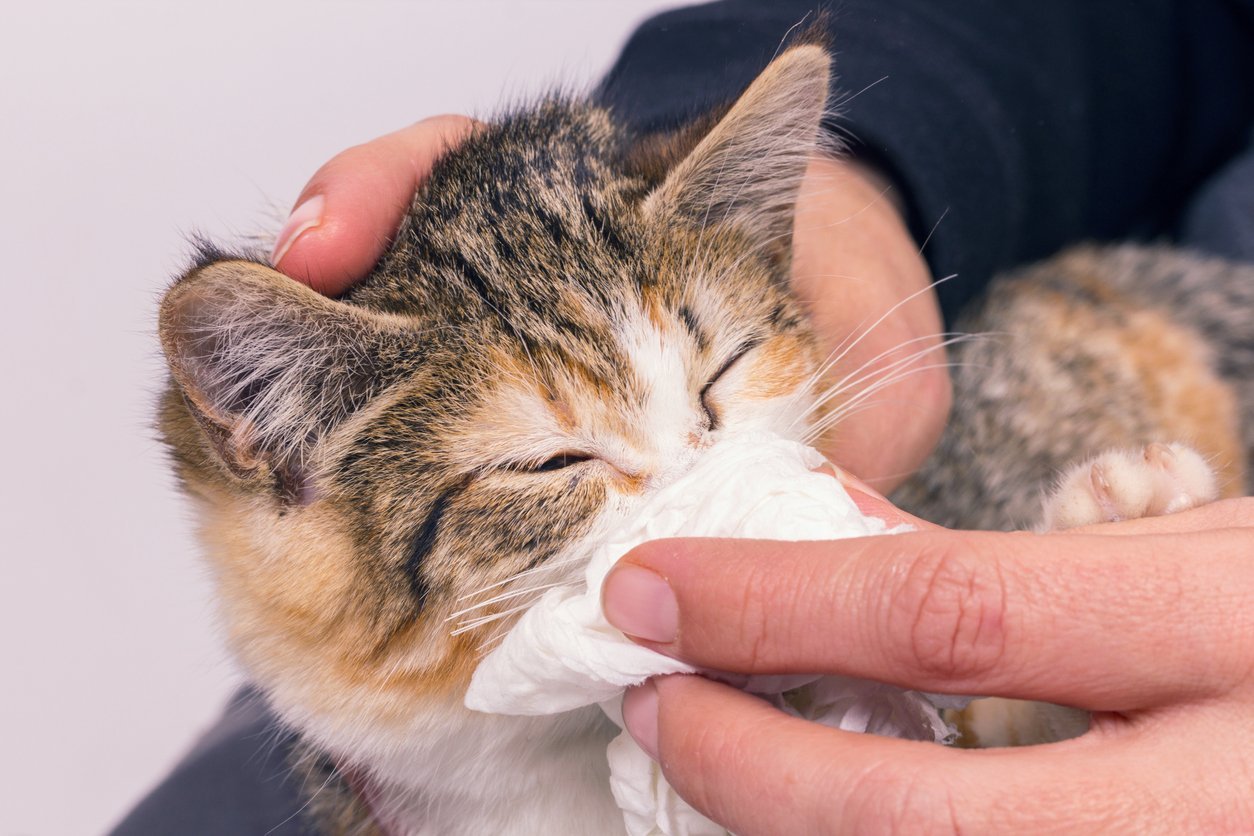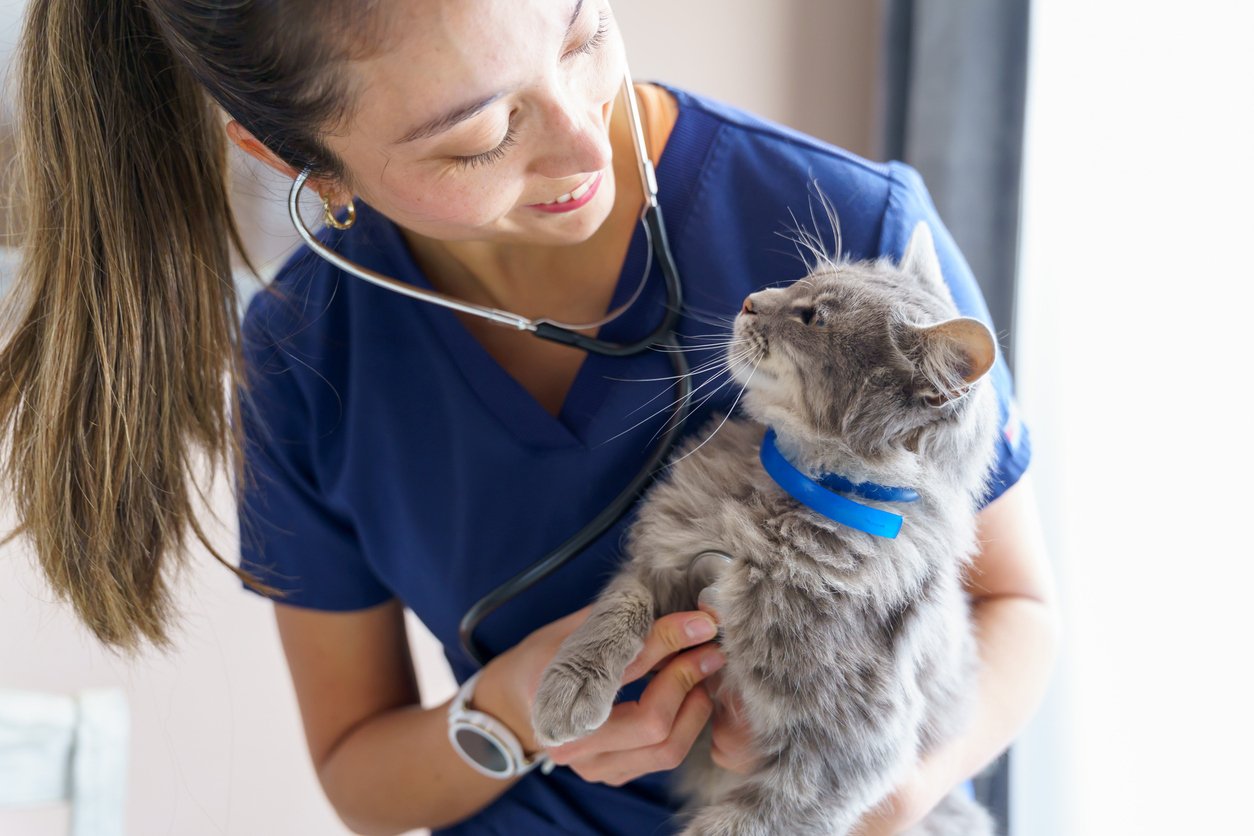Table of Contents
Allergies are something that people tend to struggle with and suffer from due to a number of causes, but did you know that our pets can have allergies as well? Just like humans, pets can have allergies to food, bug bites, and even simply seasonal allergies.
Signs and Symptoms of Allergies In Pets
We know when our pets aren’t feeling right. With cats, it can be a little more difficult to tell when something is bothering them due to their often independent nature, but in our dogs, and in our horses, we can tell when they’re acting ‘off’, or sick. Here are some telltale signs of allergies our pets may be experiencing.
Itchy skin (in one spot, or all over)
When our pets are itching their skin it’s a good indication that they may be experiencing airborne or food-related allergies. These itchy spots may be accompanied by little red bumps, which could be an indication that your pet may specifically be experiencing an allergy to fleas or other insect bites.
Sneezing and wheezing
Our animals may sneeze or wheeze from time to time, and this is usually nothing to be concerned about. However, excessive sneezing in pets can be a symptom of allergies, particularly airborne allergies to something like pollen.
Vomiting and diarrhea
Symptoms of vomiting and diarrhea in our pets can be alarming, and as a rule of thumb you should follow up any of these symptoms with your veterinarian. Keep any treats to a minimum, and always make sure that your pets are able to consume the foods you are giving them. Dogs and cats may beg for treats, but sometimes their stomachs simply aren’t equipped to handle human food. For instance, cats aren’t actually able to process dairy very well and can end up sick. Rarely these symptoms can be caused by the introduction of a new supplement to your pet’s diet. When visiting your vet for any vomiting or diarrhea in your pets, be sure to bring a list of their current foods and/or supplements, and any knowledge of any human food they may have recently consumed.
What Causes Allergies In Our Pets?
Here are the most common causes of allergies in pets, which coincide with the previously mentioned common signs and symptoms of pet allergies.
Bug bites and fleas
Surprisingly, allergies to bugs and fleas are extremely common in pets, and sometimes it takes only one bite to trigger an entire-body physical response from our pets. Flea allergies will generally occur with skin itching and tiny red bumps. Even if you’re unable to physically see any fleas on your pet, just one bite can cause your pets distress.
Pollen allergies

Like humans, our pets can be allergic to airborne allergens such as pollen! This means that going outdoors for your pet may become an event full of sneezing, wheezing, and sensitivity to cut grass and pollen allergens.
Ingredients in food or new dietary supplements
As we talked about before, our pets tend to be unable to properly process the same foods that we eat. Our pet’s diets need to be fairly consistent with the same amount of protein, nutrients, and more, and playing with that balance by giving our pets human treats such as cheese, or foreign fruits/vegetables can be dangerous and cause these dietary allergy symptoms. Cats can even have allergies to certain proteins in fish, or chicken!
Treatments to Soothe Allergy Symptoms In Pets
If your pets are experiencing allergy symptoms due to bug bites, fleas, or any other skin irritants, a great home remedy is to give them a bath with pet-friendly oatmeal or aloe vera shampoo solution, which you can usually pick up either at a pet store or at your vet’s office specifically.
For pollen and airborne allergies in pets, make sure you’re carefully wiping off their paws and fur with a damp towel to remove pollen and any dander multiple times a day, and especially when coming in from outdoors. These allergies, like human allergies, will tend to be worse in the spring and summer, and generally, your pets will have relief from allergy symptoms in the winter and the fall.
For allergies your pets may be having to food or supplements, we recommend proper research into human foods before giving them. If your pets are experiencing allergy symptoms that may be food or supplement related, scale back the dosage or feeding amount, and consult your veterinarian for severe symptoms.
Introducing A New Dietary Supplement to Your Pets Diet

You always want to do adequate research before introducing a new food or supplement. Always give a quick Google search to see if your pet can handle certain types of human treats, and if they begin experiencing allergy symptoms, stop giving them human food or new supplements.
When it comes to introducing new supplements in your pet’s diet, always begin with the vet recommended amount and instructions. Also, look for products that are notified by Health Canada to ensure the quality and contents are regulated and verified. The labels on these products are also compliant with Health Canada’s guidelines. Giving your pet glucosamine very rarely has adverse effects, but if side effects of glucosamine in pets do occur, they tend to be minimal. If your pets are experiencing minor allergy symptoms after beginning new supplements or food, scale back the dosage or amount they’re eating, and slowly integrate it into their diet.
As your pets age and their bones and joints begin to deteriorate, adding dietary supplements such as glucosamine, chondroitin, and MSM helps to improve their quality of life and relieve pain issues they may be experiencing. Tri-Acta supplements are vet-recommended for pets consumption. All of the ingredients in Tri-Acta supplements are North American and high-quality pet supplements made with no filler product or ingredients. Tri-Acta products are designed by Health Canada under the VHP program. Click here to learn more about our formula, and how Tri-Act can help your pets today.
Newsletter Signup
Subscribe to our newsletter to receive the latest news and exclusive offers.
.jpg?height=2000&name=Cliick_Integricare-DISPLAY-REVISEDV2%20(1).jpg)
Proactive & Therapeutic Joint Supplements
When given daily, Integricare joint supplements recover bone and joint injuries faster and help prevent mobility injuries from happening in the first place.










